Suction Hose Replacement 3.6L Engine
Tools Required
J 39400 Halogen Leak Detector
Removal Procedure
- Recover the refrigerant. Refer to Refrigerant Recovery and Recharging .
- Disconnect the battery negative cable. Refer to Battery Negative Cable Disconnection and Connection l.
- Remove the air filter assembly. Refer to Air Cleaner Assembly Replacement .
- Remove the radiator air baffle and deflector. Refer to Radiator Air Upper Baffle and Deflector Replacement
- Remove the cross car brace, if fitted. Refer to Front End Panel Module Carrier Assembly Replacement
- Detach the left engine cover (1) from the outer retaining clip (2).
- Detach the left engine cover (1) from the ball stud (2).
- Remove the left engine cover (1).
- Remove the left engine cover mounting bracket to cylinder head retaining bolt (2).
- Remove the left engine cover mounting bracket (1) from the cylinder head.
- Remove the exhaust manifold heat shield to air box retaining clips (2).
- Remove the exhaust manifold heat shield (1).
- Remove the insulation panel to air box retaining clips (2).
- Remove the insulation panel (1) from the engine compartment.
- Remove the remote battery positive post cover (1).
- Remove the remote battery positive post to wiring harness retaining bolt (1).
- Remove the starter motor power cable (2) and position aside.
- Remove the suction pipe upper to suction pipe lower retaining nut (1).
- Remove the suction pipe/liquid pipe retaining clip to left front chassis rail retaining bolt (3).
- Detach the liquid pipe (1) from the suction pipe/liquid pipe retaining clip (2).
- Disconnect the suction pipe upper (1) from the suction pipe lower (2).
- Remove the sealing washer (3). Refer to Sealing Washer Replacement .
- Cap or plug the suction pipe upper (1) and the suction pipe lower (2).
- Remove the suction pipe/liquid pipe pad to TX valve retaining nut (1).
- Disconnect the suction pipe/liquid pipe pad (3) from the TX valve (1).
- Remove the sealing washers (2). Refer to Sealing Washer Replacement .
- Cap or plug the suction pipe (4), liquid pipe (5) and the TX valve (1).
- Remove the liquid pipe (5) from the suction pipe/liquid pipe pad (3).
- Detach the suction pipe (2) and the liquid pipe (3) from the suction pipe/liquid pipe retaining clip (1).
- Remove the suction pipe (2) from the engine compartment.
Caution: Refer to Safety Glasses Caution in the Preface section.
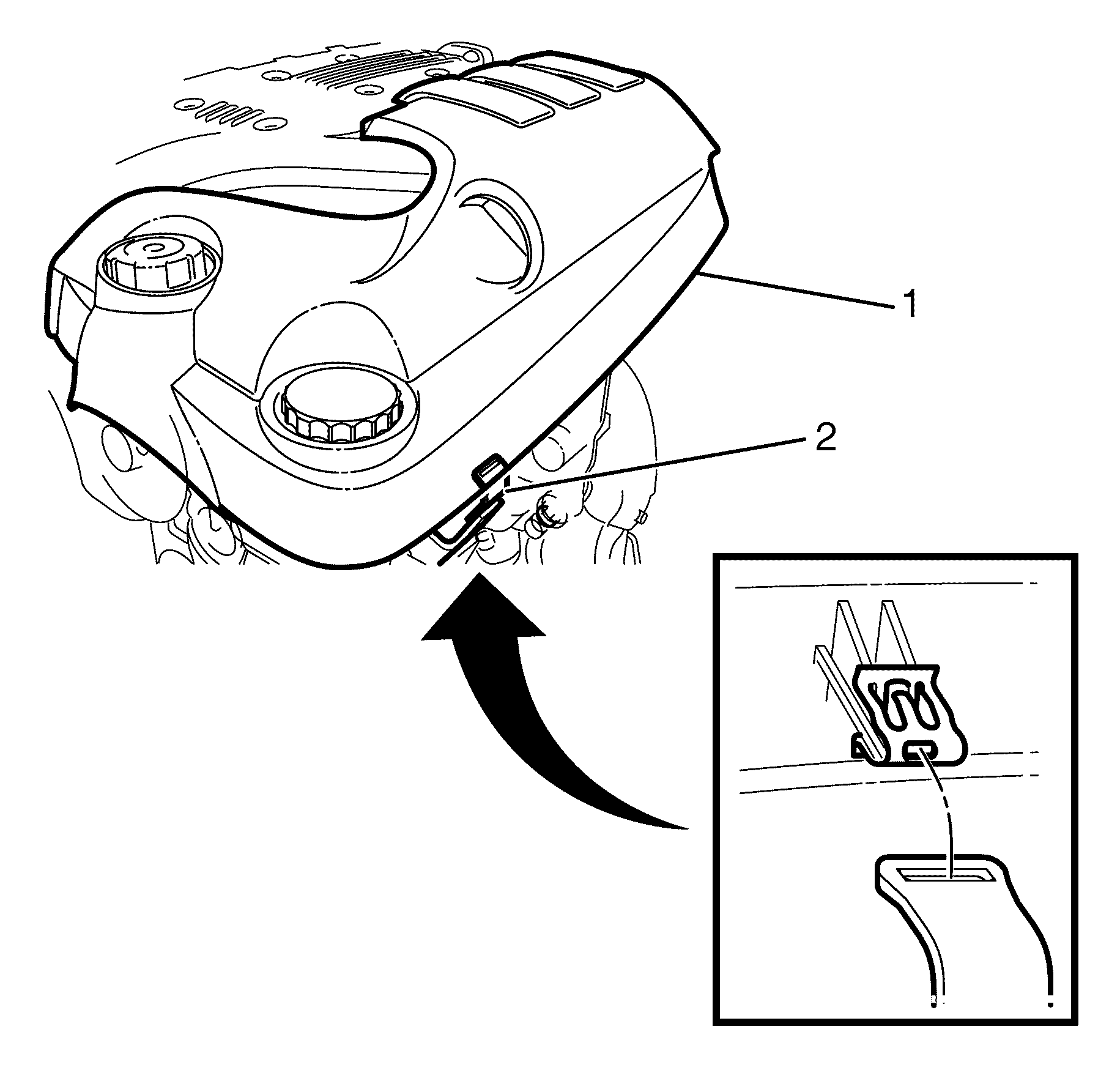
Important: The left engine cover has one front and one rear outer retaining clip.
Important: Grasp and pry the left engine cover (1) upwards to detach the left engine cover (1) from the outer retaining clip (2).
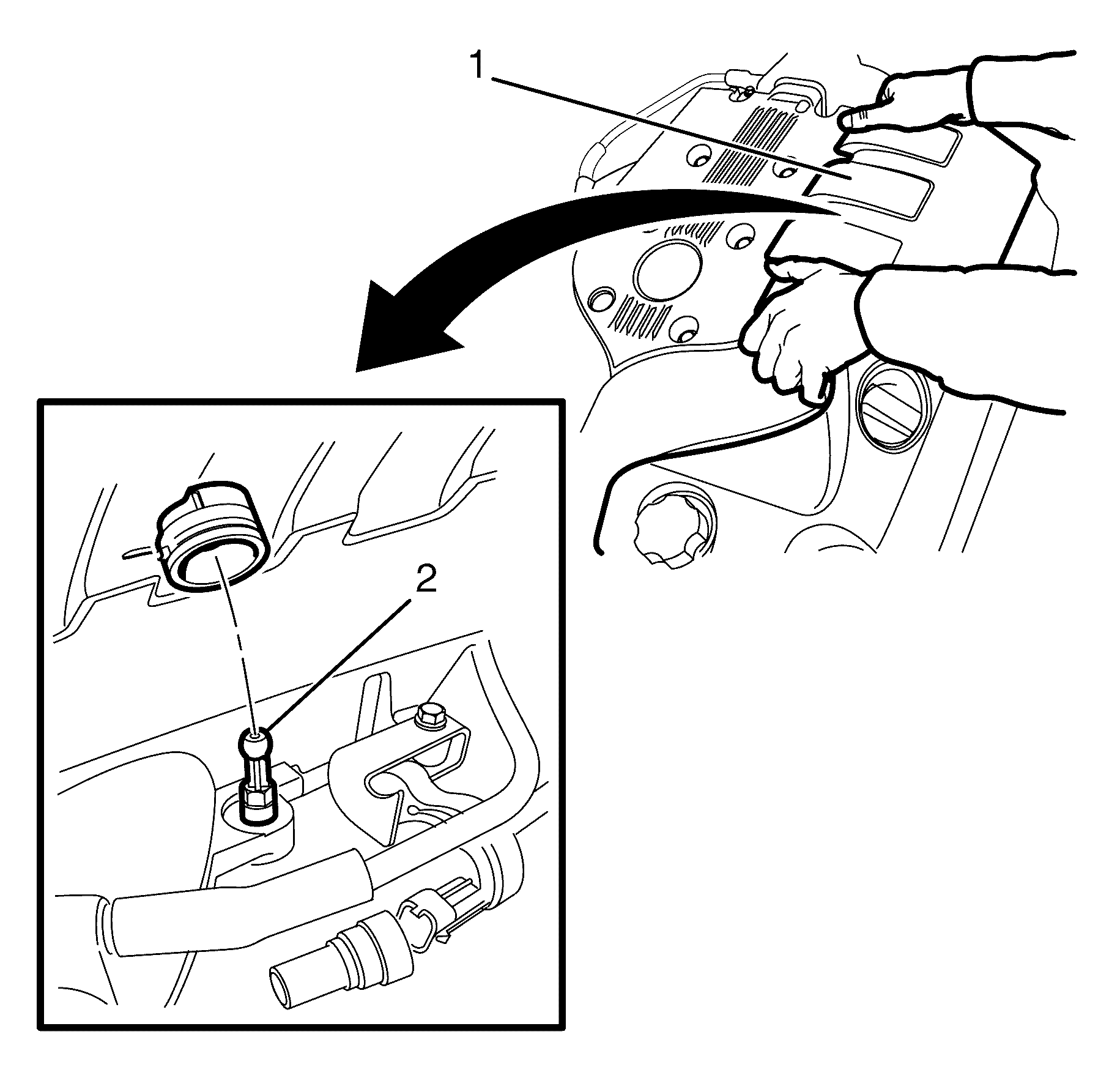
Important: Disengage the left engine cover (1) from the ball stud (2) by pulling up firmly on the rear and front of the left engine cover (1).
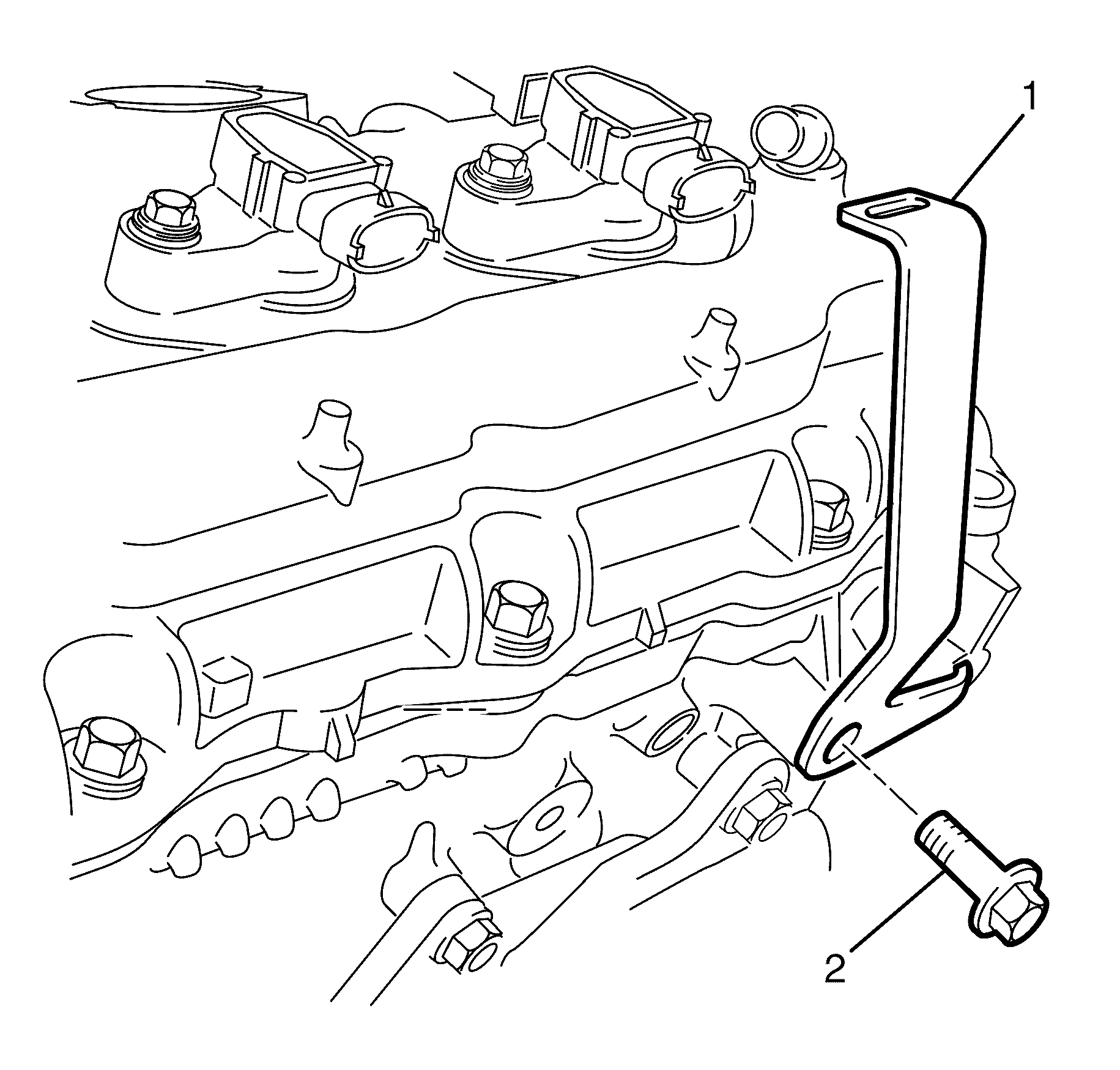
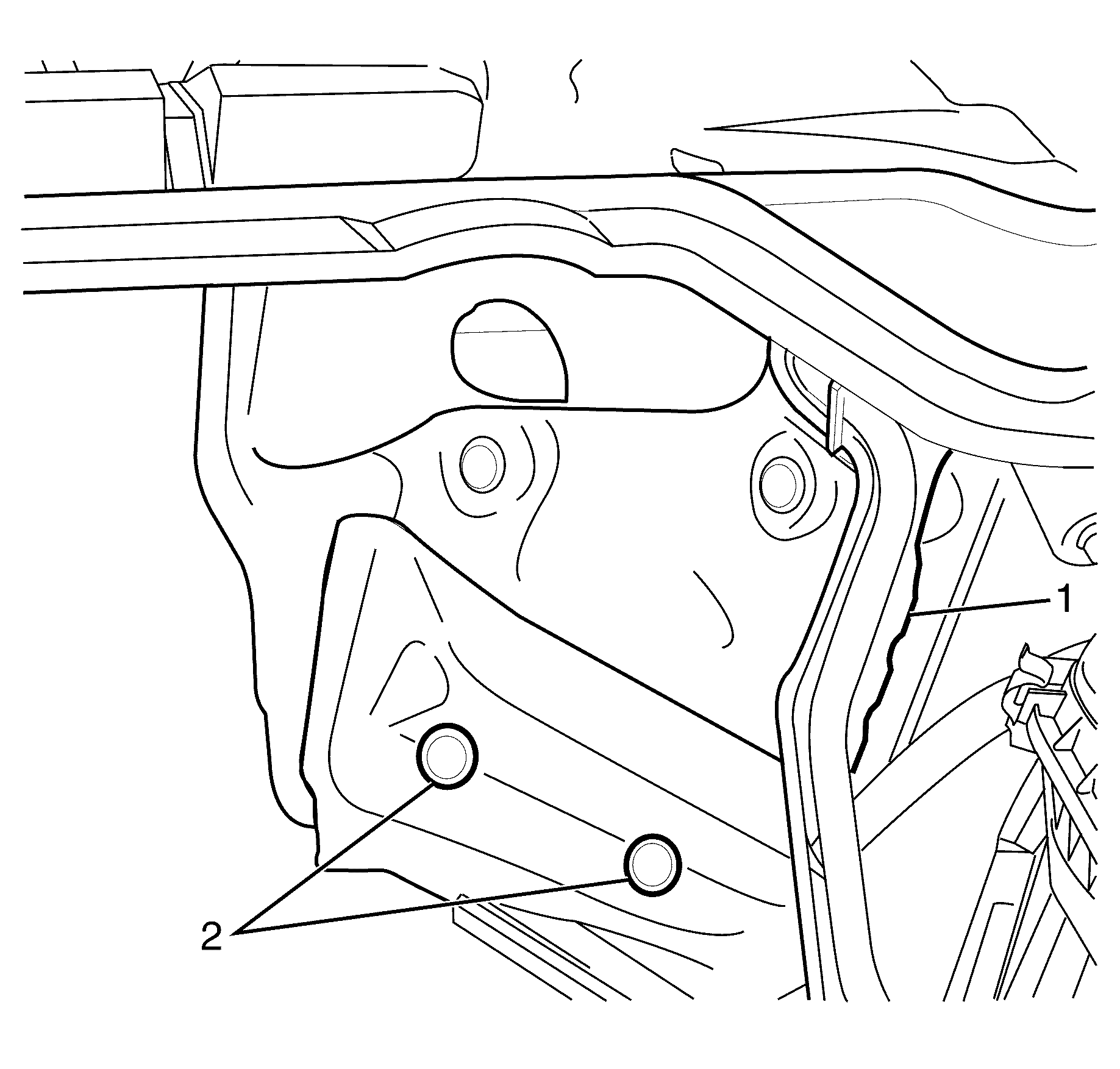
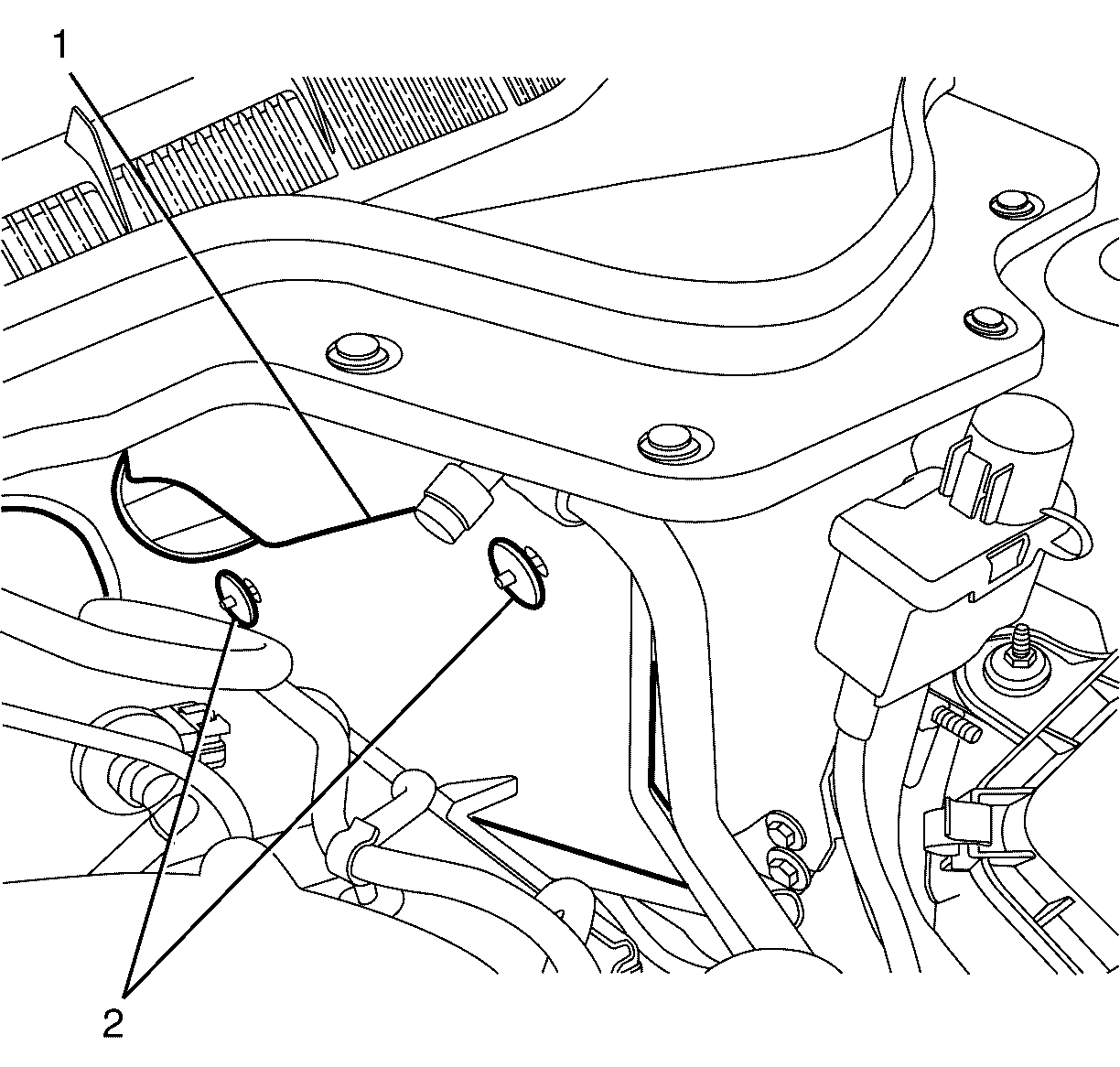
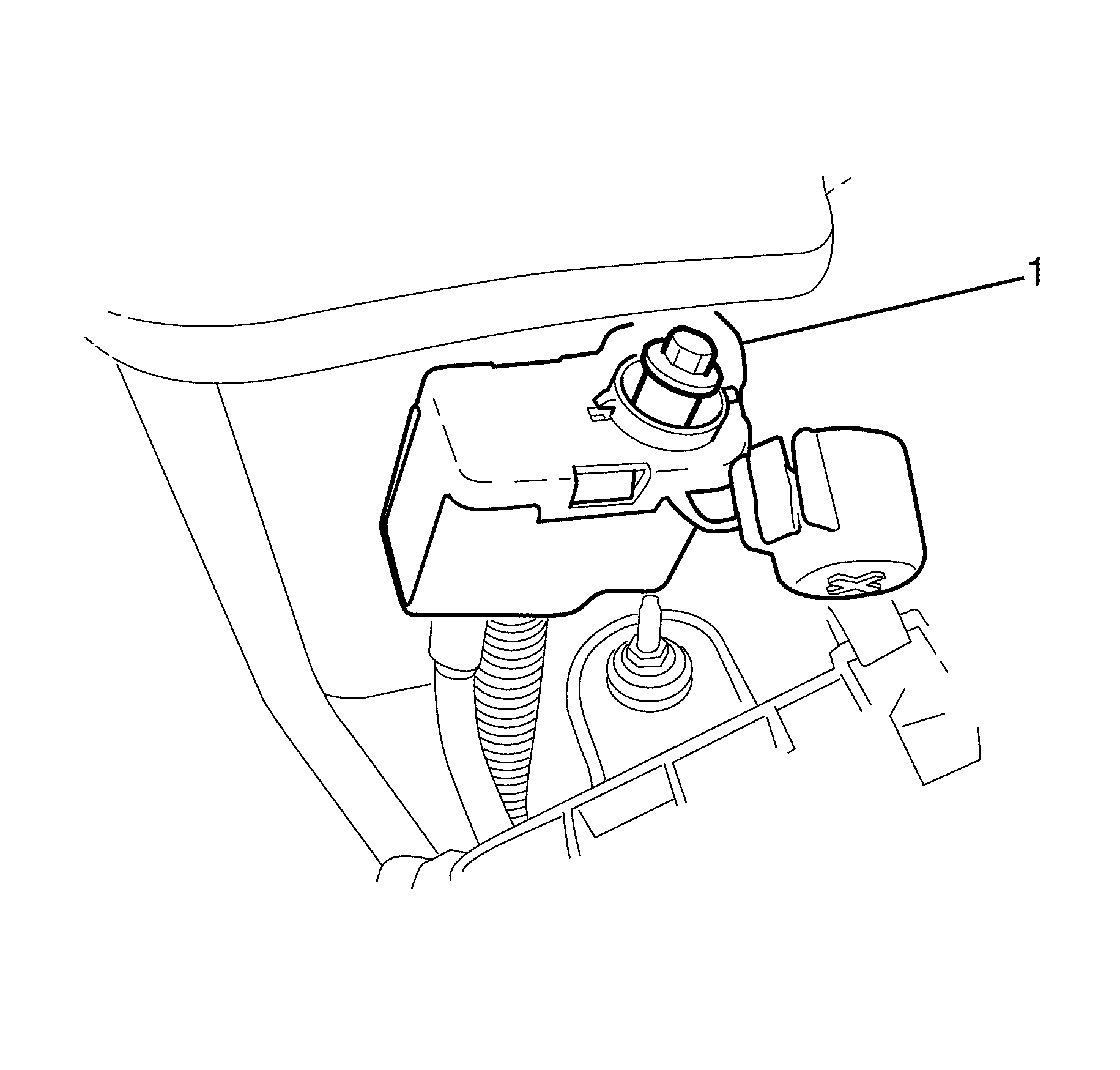
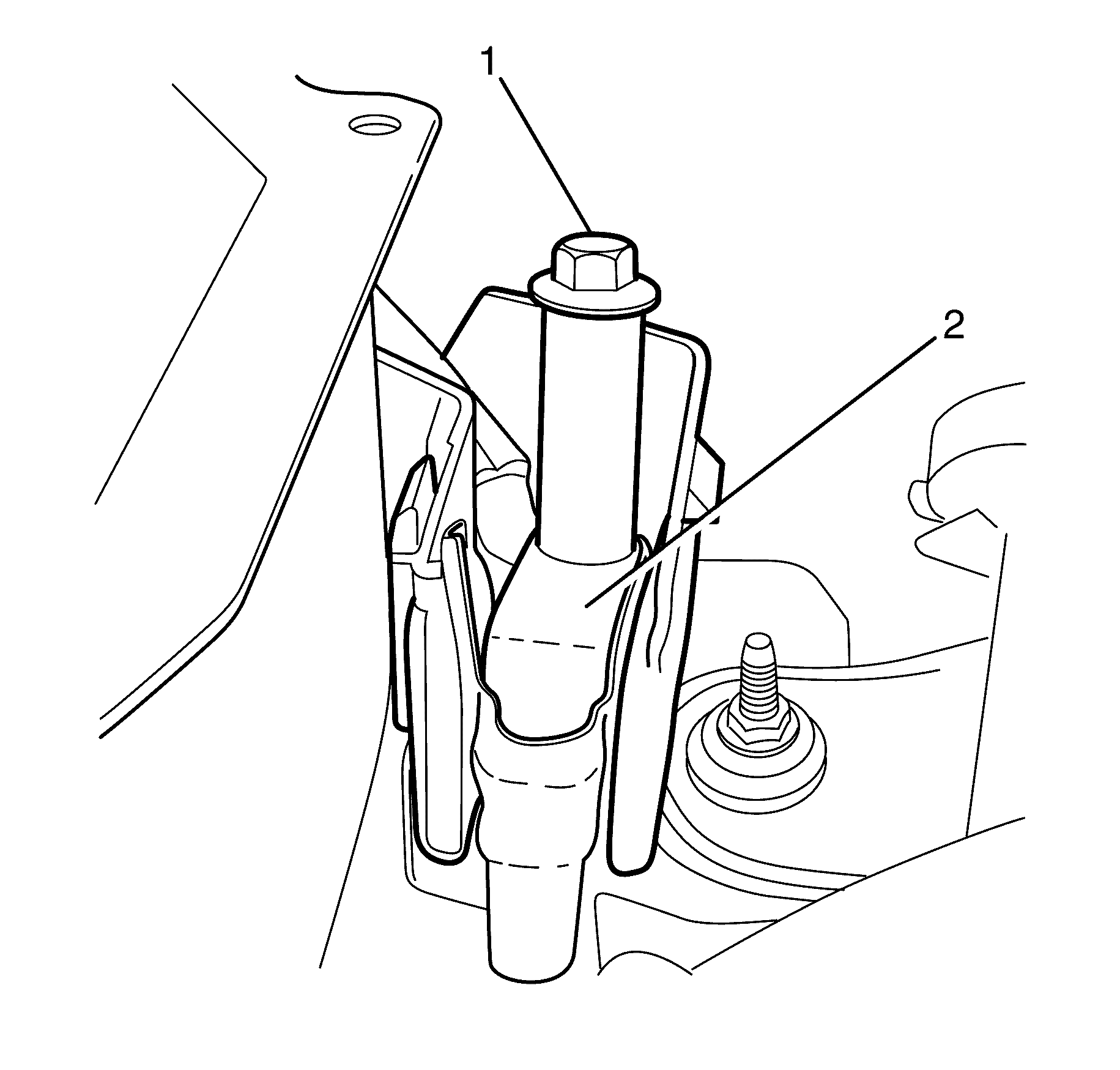
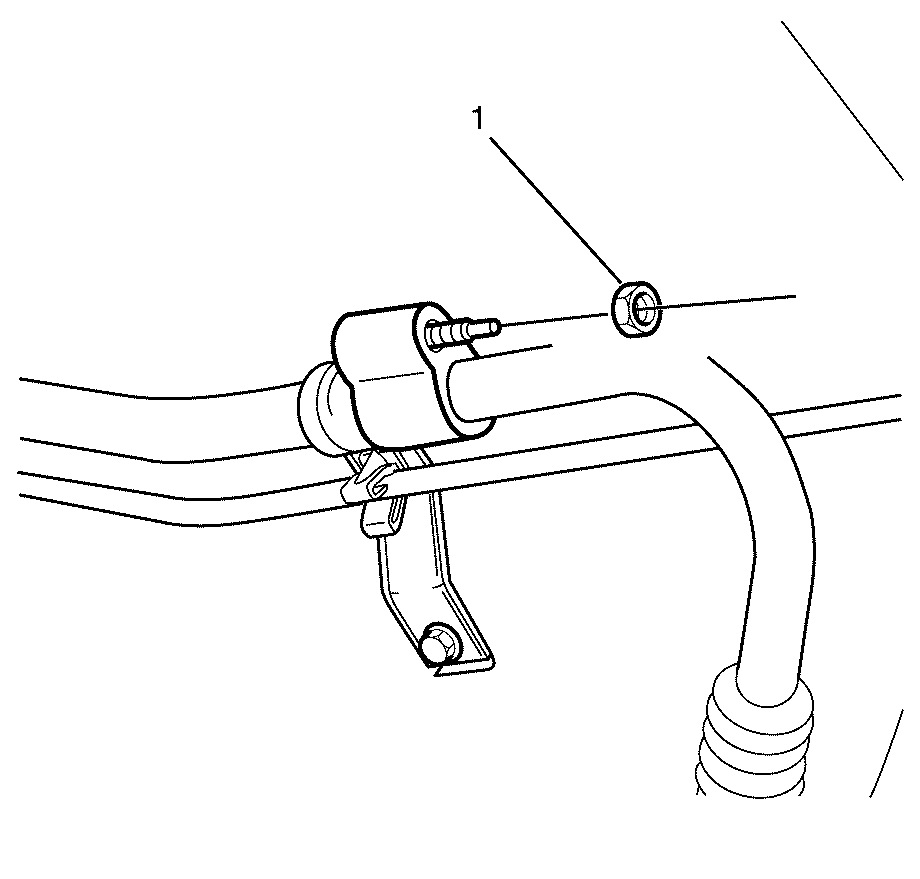
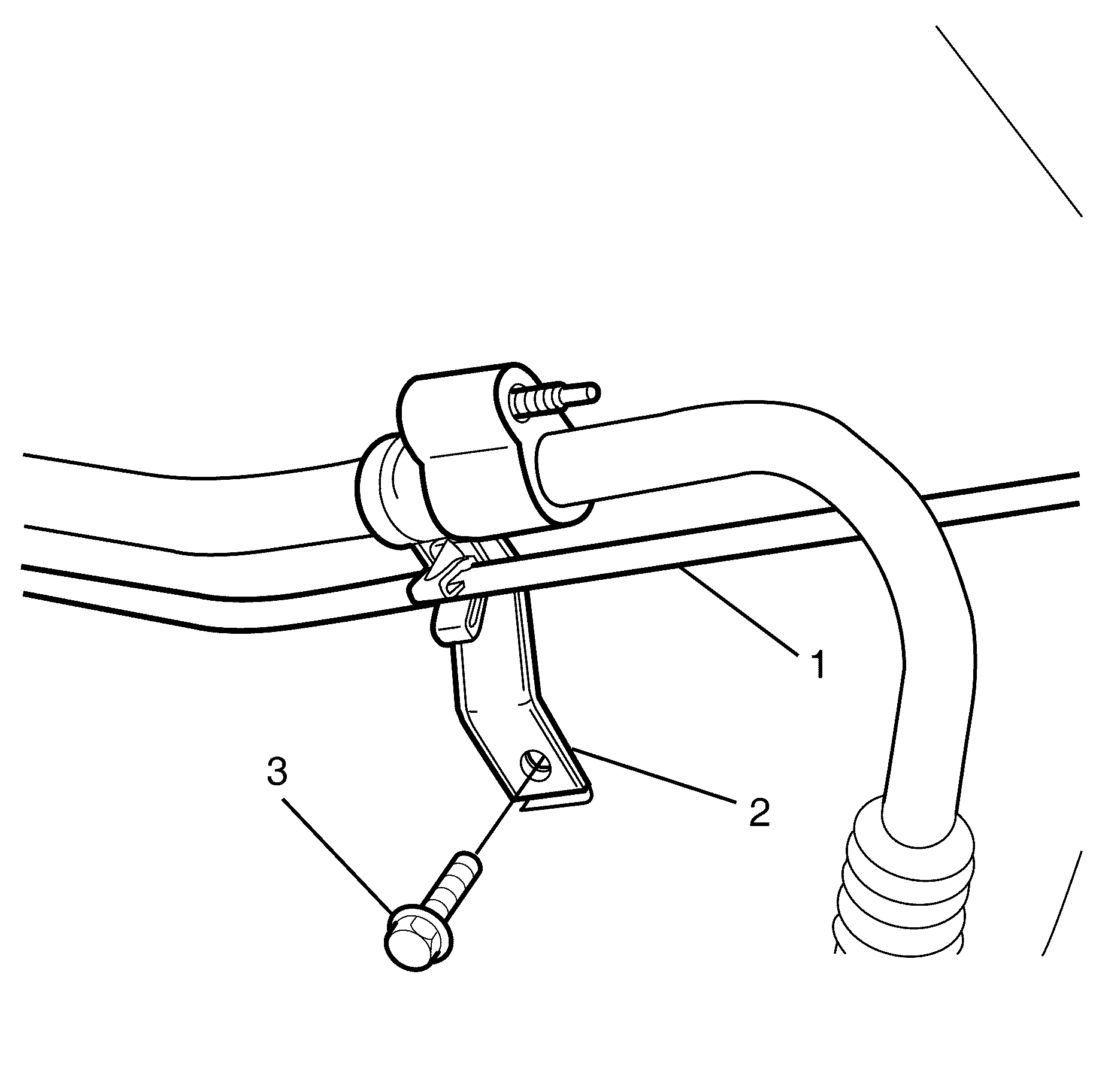
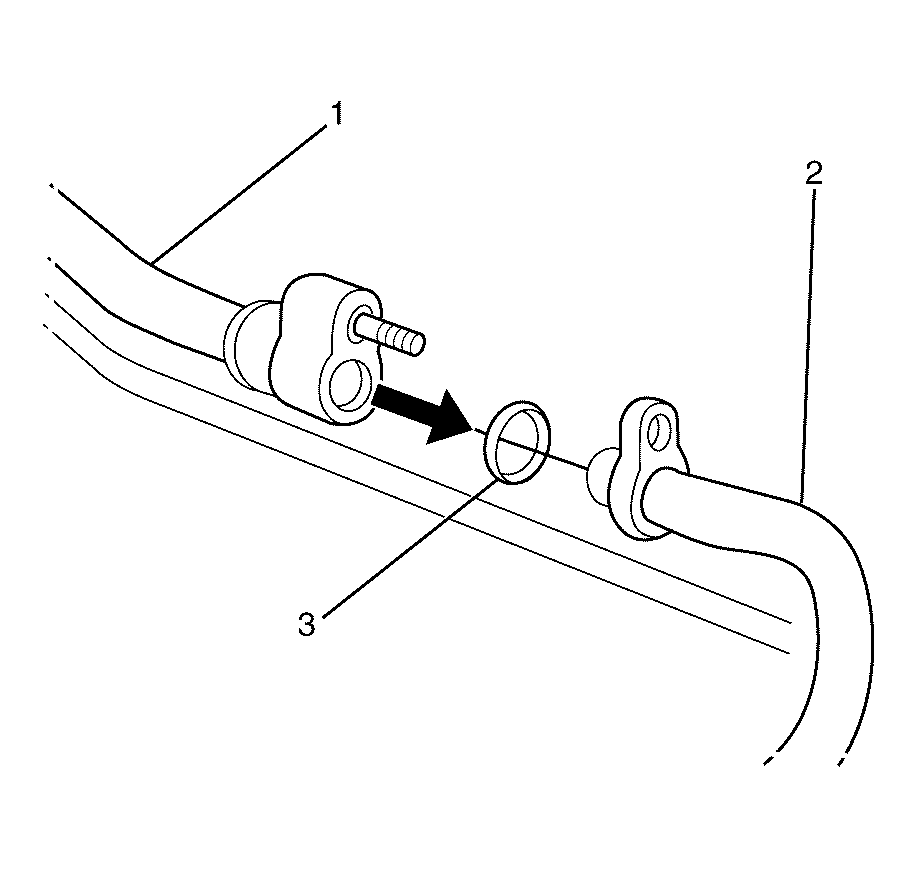
Important: The sealing washer (3) is a single use item and must be discarded after use.
Discard the sealing washer
Important: Cover any opening of the A/C system with a suitable cap or tape immediately, to prevent absorption of moisture from the atmosphere.
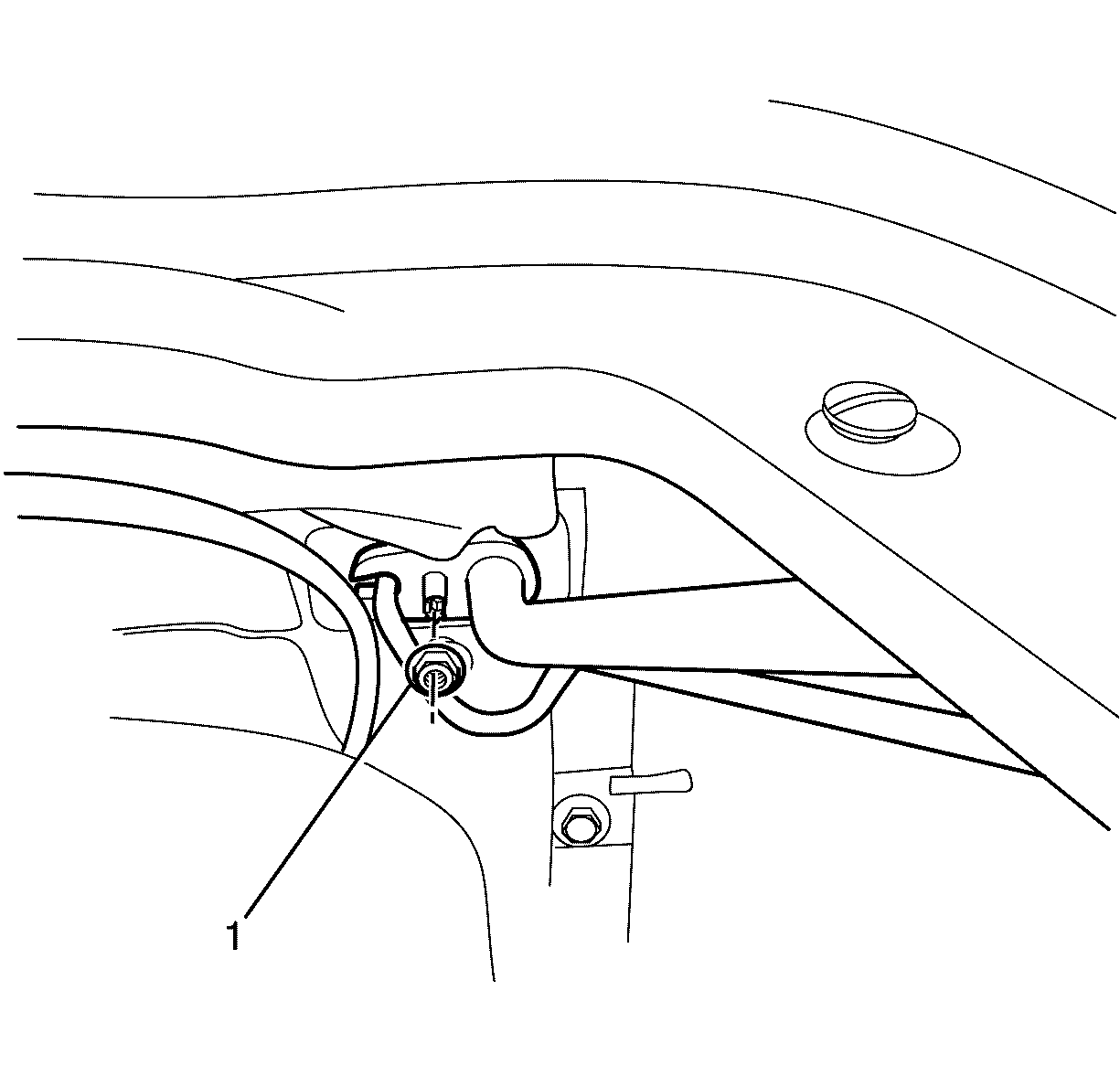
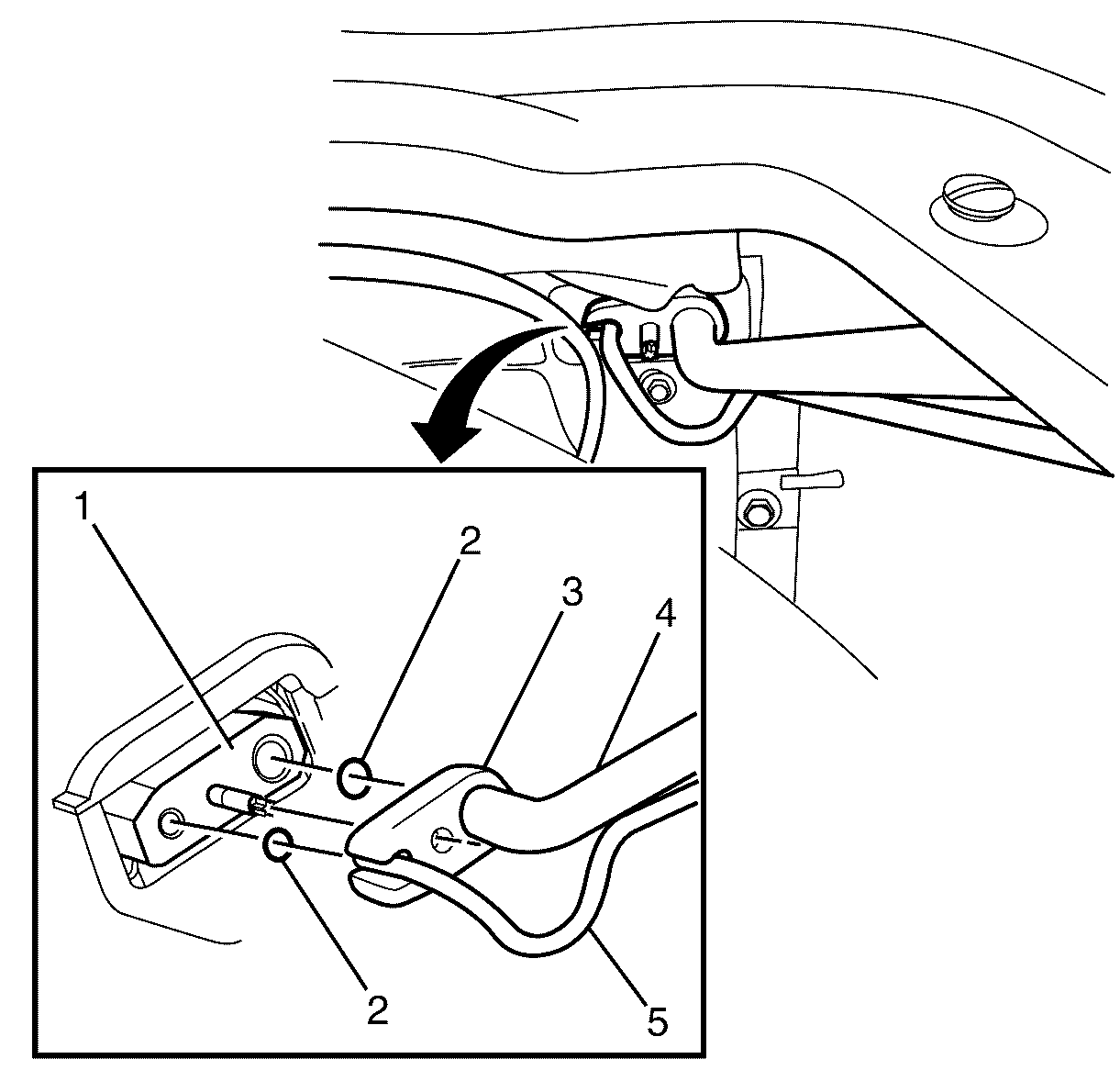
Important: The sealing washers (2) are a single use item and must be discarded after use.
Discard the sealing washers
Important: Cover any opening of the A/C system with a suitable cap or tape immediately, to prevent absorption of moisture from the atmosphere.
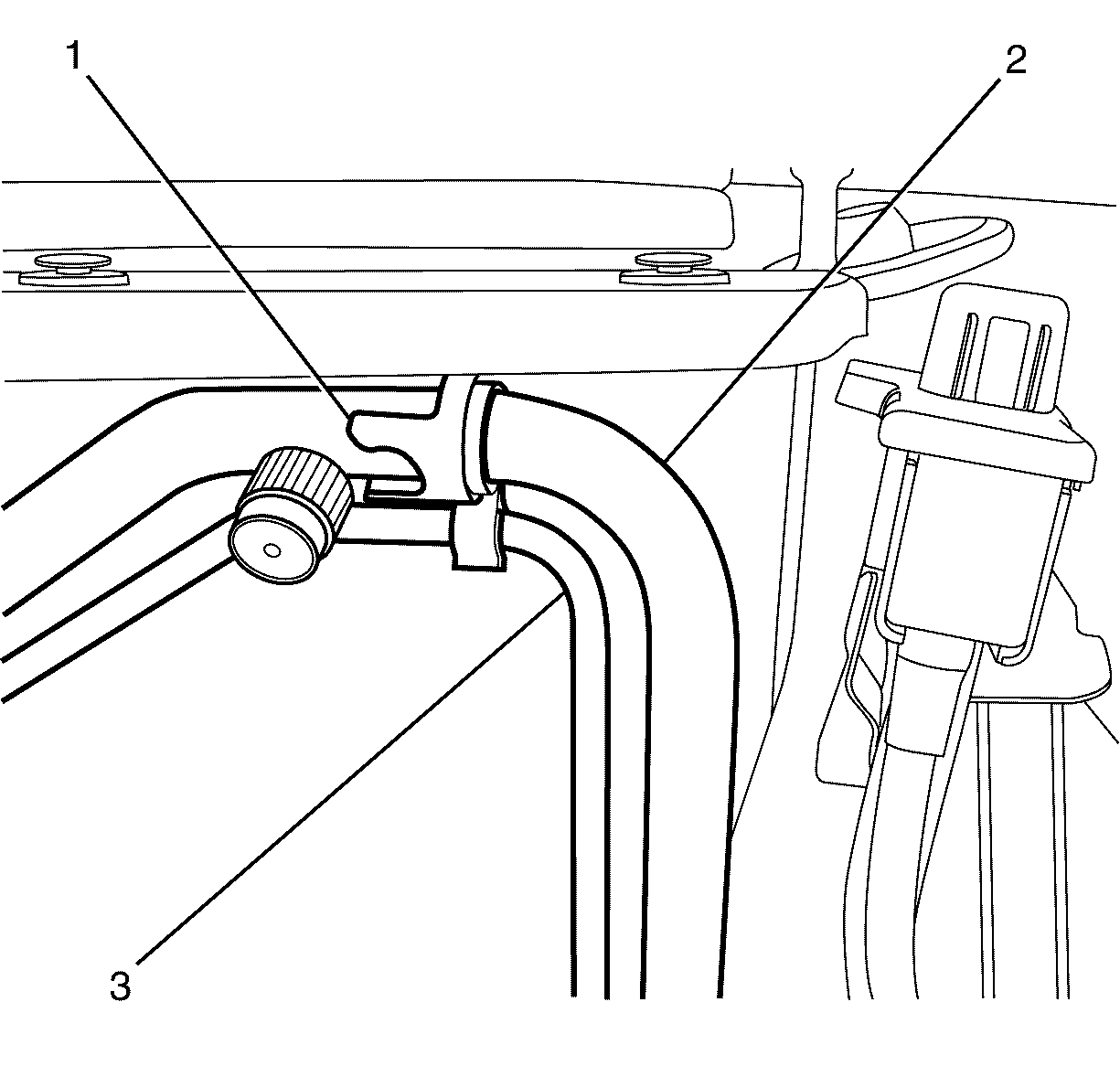
Installation Procedure
- Install the liquid pipe (5) to the suction pipe/liquid pipe pad (3).
- Remove the plugs or caps from the suction pipe (4), liquid pipe (5) and the TX valve (1).
- Install NEW sealing washers (2). Refer to Sealing Washer Replacement .
- Position the suction pipe/liquid pipe pad (3) to the TX Valve (1).
- Install the suction pipe/liquid pipe pad to TX valve retaining nut (1).
- Attach the suction pipe (2) and the liquid pipe (3) from the suction pipe/liquid pipe retaining clip (1).
- Remove the plugs or caps from the suction pipe upper (1) and the suction pipe lower (2).
- Install a NEW sealing washer (3). Refer to Sealing Washer Replacement .
- Install the suction pipe upper (1) to the suction pipe lower (2).
- Attach the liquid pipe (1) from the suction pipe/liquid pipe retaining clip (2).
- Install the suction pipe/liquid pipe retaining clip to left front chassis rail retaining bolt (3).
- Install the suction pipe upper to suction pipe lower retaining nut (1).
- Install the starter motor positive cable (2) to the remote battery positive post.
- Install the remote battery positive post to wiring harness retaining bolt (1).
- Install the remote battery positive post cover (1) to the remote battery positive post.
- Install the insulation panel (1) to the left rear side engine compartment.
- Install the insulation panel to air box retaining clips (2).
- Install the exhaust manifold heat shield (1).
- Install the exhaust manifold heat shield to air box retaining clips (2).
- Install the left engine cover mounting bracket (1)
- Install the left engine cover mounting bracket to cylinder head retaining bolt (2).
- Position the left engine cover (1) over the intake manifold so the grommet is aligned with the ball stud (2).
- Attach the left engine cover (1) to the ball stud (2).
- Attach the left engine cover (1) to the outer retaining clip (2).
- Install the cross car brace, if fitted. Refer to Front End Panel Module Carrier Assembly Replacement
- Install the radiator air baffle and deflector. Refer to Radiator Air Upper Baffle and Deflector Replacement
- Install the air filter assembly. Refer to Air Cleaner Assembly Replacement .
- Connect the battery negative cable. Refer to Battery Negative Cable Disconnection and Connection .
- Evacuate and recharge the A/C system. Refer to Refrigerant Recovery and Recharging .
- Leak test the fittings of the component using electronic leak detector.

Important: DO NOT coat the NEW sealing washers (2) with oil, they must be fitted dry. The use of mineral oil will render the sealing washers (2) useless, as the sealing washers (2) WILL swell causing refrigerant to leak out.
Notice: Refer to Fastener Notice in the Preface section.

Tighten
Tighten the nut to 22 N·m(16 lb ft).

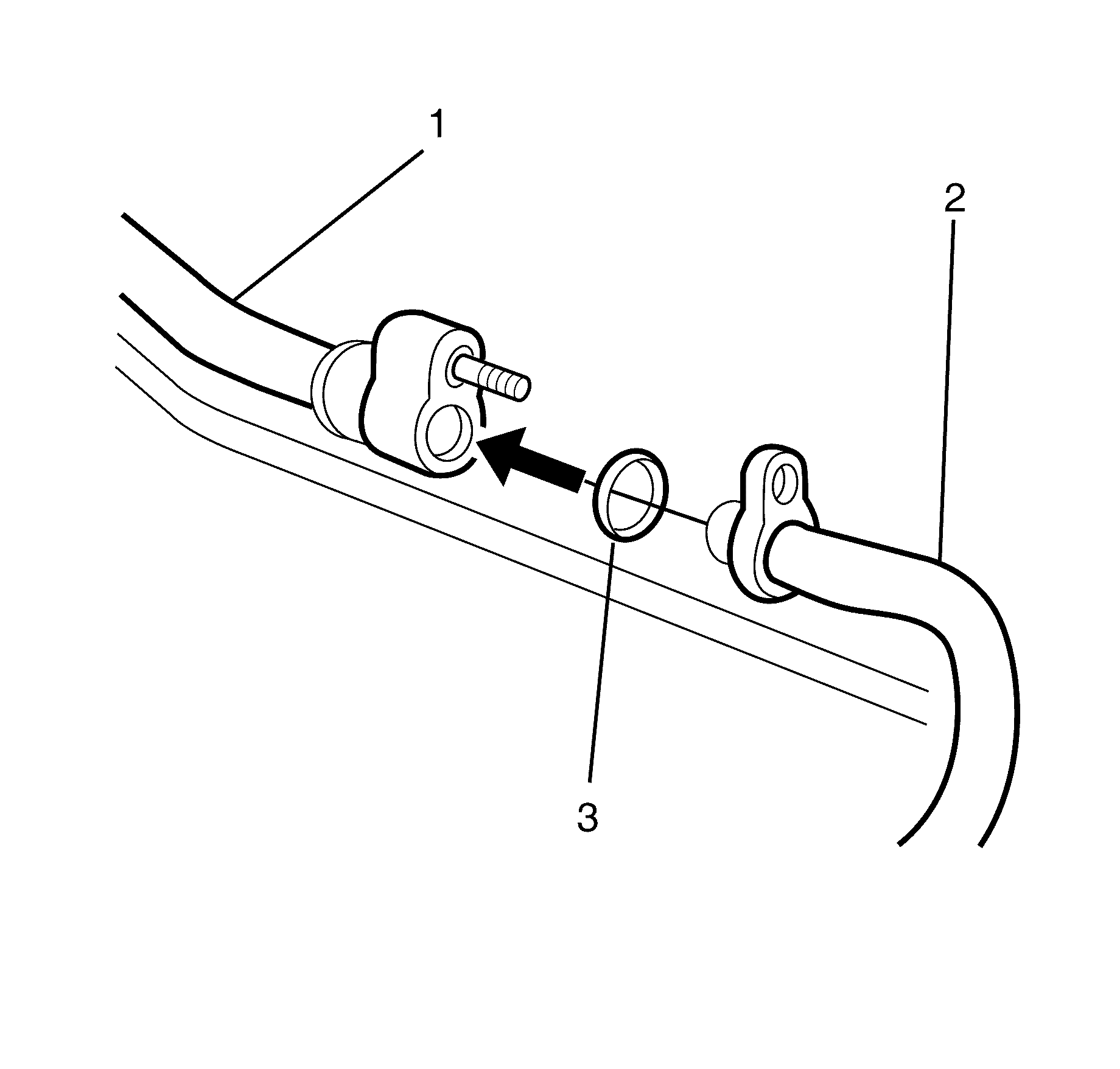
Important: DO NOT coat the NEW sealing washer (3) with oil, they must be fitted dry. The use of mineral oil will render the sealing washer (3) useless, as the sealing washer (3) WILL swell causing refrigerant to leak out.

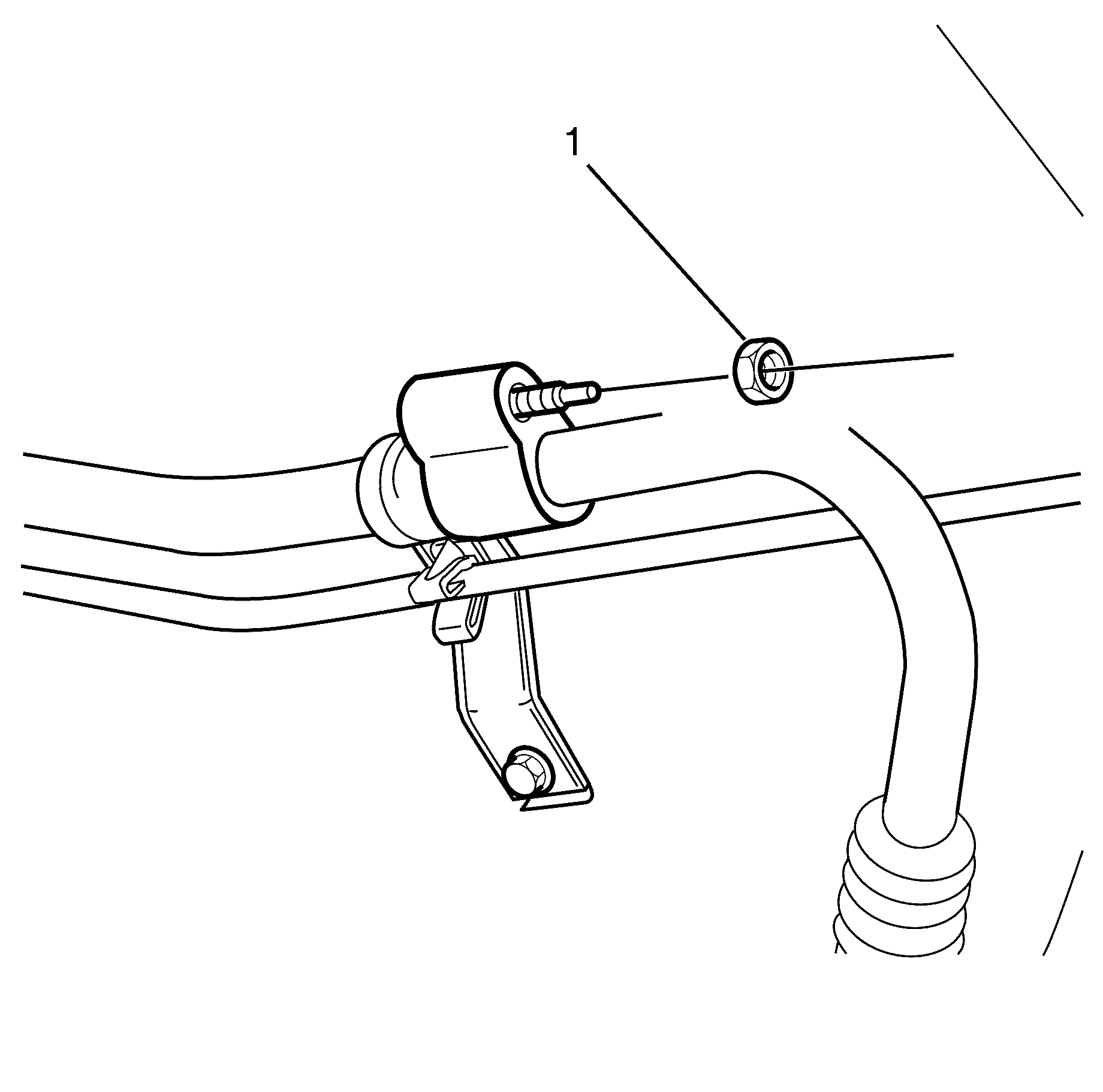
Tighten
Tighten the nut to 22 N·m( 16 lb ft).

Tighten
Tighten the bolt to 15 N·m (11 lb ft).

Important: Make sure the clips on the remote battery positive post cover (1) are engaged to avoid an induced rattle condition.



Tighten
Tighten the bolt to 35 N·m (26 lb in).

Important: Press the left engine cover (1) down firmly near the ball stud to attach the left engine cover (1) to the ball stud (2).

Important: The left engine cover has one front and one rear outer retaining clip.
Important: Press the left engine cover (1) down firmly near the outer retaining clips to attach the left engine cover (1) to the outer retaining clip (2).
Suction Hose Replacement 6.0L Engine
Tools Required
J 39400 Halogen Leak Detector
Removal Procedure
- Recover the refrigerant Refer to Refrigerant Recovery and Recharging.
- Disconnect the battery negative cable. Refer to Battery Negative Cable Disconnection and Connection.
- Remove the air filter assembly. Refer to Air Cleaner Assembly Replacement.
- Remove the radiator air baffle and deflector. Refer to Radiator Air Upper Baffle and Deflector Replacement.
- Remove the engine cover. Refer to Engine Cover Replacement.
- Remove the exhaust manifold heat shield to air box retaining clips (2).
- Remove the exhaust manifold heat shield (1).
- Remove the insulation panel to air box retaining clips (2).
- Remove the insulation panel (1) from the engine compartment.
- Remove the remote battery positive post cover (1).
- Remove the remote battery positive post to wiring harness retaining bolt (1).
- Remove the starter motor power cable (2) and position aside.
- Remove the suction pipe upper to suction pipe lower retaining nut (1).
- Remove the suction pipe/liquid pipe retaining clip to left front chassis rail retaining bolt (3).
- Detach the liquid pipe (1) from the suction pipe/liquid pipe retaining clip (2).
- Disconnect the suction pipe upper (1) from suction pipe lower (2).
- Remove the sealing washer (3). Refer to Sealing Washer Replacement.
- Cap or plug the suction pipe upper (1) and the suction pipe lower (2).
- Remove the suction pipe/liquid pipe pad to TX Valve retaining nut (1).
- Disconnect the suction pipe/liquid pipe pad (3) from the TX valve (1).
- Remove the sealing washers (2). Refer to Sealing Washer Replacement.
- Cap or plug the suction pipe (4), liquid pipe (5) and the TX valve (1).
- Remove the liquid pipe (5) from the suction pipe/liquid pipe pad (3).
- Detach the suction pipe (2) and the liquid pipe (3) from the suction pipe/liquid pipe retaining clip (1).
- Remove the suction pipe (2) from the engine compartment
Caution: Refer to Safety Glasses Caution in the Preface section.







Important: The sealing washer (3) is a single use item and must be discarded after use.
Discard the sealing washer
Important: Cover any opening of the A/C system with a suitable cap or tape immediately, to prevent absorption of moisture from the atmosphere.


Important: The sealing washers (2) are a single use item and must be discarded after use.
Discard the sealing washers
Important: Cover any opening of the A/C system with a suitable cap or tape immediately, to prevent absorption of moisture from the atmosphere.

Installation Procedure
- Install the liquid pipe (5) to the suction pipe/liquid pipe pad (3).
- Remove the plugs or caps from the suction pipe (4), liquid pipes (5) and the TX valve (1).
- Install NEW sealing washers (2). Refer to Sealing Washer Replacement.
- Position the suction pipe/liquid pipe pad (3) to the TX Valve (1).
- Install the suction pipe/liquid pipe pad to TX valve retaining nut (1).
- Attach the suction pipe (2) and the liquid pipe (3) from the suction pipe/liquid pipe retaining clip (1).
- Remove the plugs or caps from the suction pipe upper (1) and the suction pipe lower (2).
- Install a NEW sealing washer (3). Refer to Sealing Washer Replacement.
- Install the suction pipe upper (1) to the suction pipe lower (2).
- Attach the liquid pipe (1) from the suction pipe/liquid pipe retaining clip (2).
- Install the suction pipe/liquid pipe retaining clip to left front chassis rail retaining bolt (3).
- Install the suction pipe upper to suction pipe lower retaining nut (1).
- Install the starter motor positive cable (2) to the remote battery positive post.
- Install the remote battery positive post to wiring harness retaining bolt (1).
- Install the remote battery positive post cover (1) to the remote battery positive post.
- Install the insulation panel (1) to the left rear side engine compartment.
- Install the insulation panel to air box retaining clips (2).
- Install the exhaust manifold heat shield (1).
- Install the exhaust manifold heat shield to air box retaining clips (2).
- Install the radiator air baffle and deflector. Refer to Radiator Air Upper Baffle and Deflector Replacement.
- Install the air filter assembly. Refer to Air Cleaner Assembly Replacement.
- Install the engine cover. Refer to Engine Cover Replacement.
- Connect the battery negative cable. Refer to Battery Negative Cable Disconnection and Connection.
- Evacuate and recharge the A/C system. Refer to Refrigerant Recovery and Recharging.
- Leak test the fittings of the component using electronic leak detector.

Important: DO NOT coat the NEW sealing washers (2) with oil, they must be fitted dry. The use of mineral oil will render the sealing washers (2) useless, as the sealing washers (2) WILL swell causing refrigerant to leak out.
Notice: Refer to Fastener Notice in the Preface section.

Tighten
Tighten the nut to 22 N·m(16 lb ft).


Important: DO NOT coat the NEW sealing washer (3) with oil, they must be fitted dry. The use of mineral oil will render the sealing washer (3) useless, as the sealing washer (3) WILL swell causing refrigerant to leak out.

Tighten
Tighten the bolt to 22 N·m(16 lb ft).

Tighten
Tighten the nut to 22 N·m(16 lb ft).

Tighten
Tighten the bolt to 15 N·m (11 lb ft).

Important: Make sure the clips on the remote battery positive post cover (1) are engaged to avoid an induced rattle condition.


